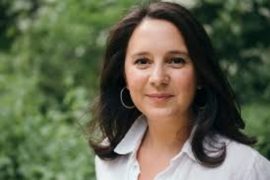While some accuse the Guardian of institutional antisemitism, our research over the years has certainly demonstrated that the outlet is, at the very least, institutionally sympathetic to anti-Semites whose racism is cloaked behind an anti-Zionist veneer.
The latest example is a 4,200 word profile of Lara Sheehi, a Lebanese-born psychoanalytic therapist and George Washington University psychology professor who’s the target of a civil rights complaint by Stand With US, on behalf of several female students, accusing her of discrimination.
The piece (“Inside the war tearing psychoanalysis apart: ‘The most hatred I’ve ever witnessed'”, June 16) was written by Guardian contributor J Oliver Conroy.
Sheehi, who’s also president of the Society for Psychoanalysis and Psychoanalytic Psychology, Division 39 of the American Psychological Association and chair of the Teachers’ Academy of the American Psychoanalytic Association, was already the subject of a sympathetic Guardian article earlier in the year.
In the current piece, we’re told that she’s influenced by the likes of Che Guevara and Franz Fannon, which is telling. While Guevara was a Marxist, terrorist revolutionary, the latter was a psychiatrist and Marxist, who favoured violence against both military and civilian targets within ‘anti-colonial’ struggles.
The article introduces the controversy as follows:
[Leehi] was unaware that some Jewish students were distraught about a recent extracurricular event she had organized, where a Palestinian law professor had sharply chastised Israel, and had been waiting to raise their concerns. In a heated, tearful conversation, the students accused the law professor, and by implication Sheehi, of antisemitism; Sheehi rejected the accusation and suggested that the students were the ones suffering from unexamined racism.
However, here’s what the SwU complaint says about the Palestinian law professor who had “sharply chastised Israel”:
On Friday, September 30, 2022…Professor Sheehi invited a guest lecturer to deliver a “brown bag” presentation as part of the “Psychoanalysis and the Arab World” lab that Professor Sheehi had newly founded. Psychology students were encouraged to attend the event, which was coordinated and introduced by Professor Sheehi. The speaker, Dr. Nadera Shalhoub-Kevorkian, is known for making patently false accusations reminiscent of historic antisemitic blood libels, including claiming (without any factual support) that Israel tests its weapons systems on Palestinians children.
Throughout her lecture, Dr. Shalhoub-Kevorkian demonized Israel, and Israelis in general, while also referring to “Jews.” She suggested that good deeds done by Jews and Israelis are done to mask sinister activity. Invoking age-old antisemitic tropes about Jews using money for nefarious purposes, Dr. Shalhoub-Kevorkian claimed that humanitarian and philanthropic efforts by Jews and Israelis must be seen as suspect. She denigrated Israel’s disaster relief work around the world, and stated that Israel “use[s] tikkun olam [the Jewish value of bettering the world] to camouflage [Israel’s] oppressive power.”
At one point, Dr. Shalhoub-Kevorkian suggested that one of the correct responses to this activity of Jews and Israelis is violent resistance. Specifically, she noted that appropriate resistance includes throwing stones. Along these lines, Dr. Shalhoub-Kevorkian lionized Ahmed Manasra, a Palestinian teenager who is currently in prison in Israel for having participated in 2015, as a 13-year-old, together with his 15-year-old cousin, in the unprovoked stabbing of a Jewish 13-year-old child who was leaving a candy store in Pisgat Ze’ev.
So, according to the complaint, the guest lecturer didn’t merely “chastise Israel”. She demonised Israel and Jews, and lauded Palestinian terror attacks against Israeli civilians – including the targeting of children. In fact, in March 22, Sheehi herself tweeted support for the Palestinian in prison for stabbing the Jewish child.
The Guardian contributor tries to frame the debate as one not narrowly about Israel, the Palestinians and antisemitism, but about whether psychoanalysts should be “neutral interlocutors, healing one mind at a time, or activists, diagnosing society’s pathologies and fighting injustice”.
However, Conroy, in addition to whitewashing the visiting professor’s antisemitism that we showed above, reveals his own biases in the following paragraph:
Psychoanalysis was popularized in the US by Jewish refugees from Nazi-era Europe, and its practitioners today are often older, white and Jewish – a demographic that tends to be liberal on most issues except Israel. If that is the archetype, then Sheehi breaks the mold: she is 38, Arab and queer; a professional biography says she “works on race and white supremacy, decolonial struggles [and] power configurations in class and gender”, and practices “from a trans-inclusive feminist and liberation theory model”.
First, the source cited by Conroy on the demographics of current psychoanalysts does not include religion as one of the categories. So, his claim that today’s practitioners are “often older, white and Jewish” is unsubstantiated.
Further, Conroy intuits from his (unproven) claim about the disproportionately Jewish make-up of practitioners that they are, therefore, “liberal on most issues except Israel”, indicating his belief that supporting Israel – which has the best human rights record in the Mid-East – is somehow at odds with liberalism.
Though this egregiously skewed ideological lens, Sheehi, who’s described as an “Arab and queer” “trans-inclusive” feminist and ‘anti-racist’ activist, wins the intersectional competition – as she’s seen as part of the progressive vanguard challenging the oppressive, white, Jewish, Zionist psychoanalytic hegemon.
Later in the article, Conroy casually recounts the following:
In September, at GW, Sheehi helped organize a “brown-bag lunch” with Nadera Shalhoub-Kevorkian, a Palestinian law professor at the Hebrew University of Jerusalem, on the topic “Global Mental Health ‘Expertise’, ‘Therapeutic’ Military Occupation and Its Deadly Exchange”. Shalhoub-Kevorkian’s talk argued that Israel uses global mental health programs as a “cunning” way to prop up its military occupation, and called for psychologists to beware of co-optation by state projects.
Though he didn’t mean to, Conroy – in casually observing Sheehi’s platforming of the anti-Zionist conspiracy that Israel ‘cunningly’ uses its global mental health programs to “prop up its military occupation” – reveals the antisemitism at the core of such all-consuming hatred of Israel.
Also, though the Guardian article cites some of SwU’s complaint alleging antisemitism, it leaves much out.
The complaint centers around students’ testimony that, on the first day of a required diversity class last fall, Sheehi asked students to share their names and identities. She went around the room “affirming” each student’s introduction, until, when one student said she was born in Israel, she said “It’s not your fault you were born in Israel”.
The remark evidently set the tone for the course, and was allegedly followed by the professor retaliating against the Jewish students when they raised concerns about her behavior with the administration.
The complaint, which claimed the university violated the US Civil Rights Act of 1964, says Sheehi accused the students of racism to other faculty members, encouraged classmates to demean and exclude them for their Jewish identity, and took disciplinary measures against them after they confronted her.
Further, during the one-semester course, Sheehi reportedly subjected Jewish students to antisemitic coursework and lectures, evoked antisemitic tropes about Jews being dishonest and using their influence for nefarious purposes, and suggested their failure to acquiesce would threaten their future as clinical psychologists.
Conroy, however, after his truncated version of the complaint, writes the following in a clear attempt to undermine the students:
As news of Sheehi’s situation reverberated through the psychoanalysis world, quite a few colleagues, including many who are Jewish, leaped to defend her. The GW case, they believe, is a cynical attempt to clamp down on legitimate criticism of Zionism. As an organization, StandWithUs seems like an ideological “ambulance-chaser”, a Jewish psychologist told me; another person views the group as a “proto-fascist” surrogate for Israel’s increasingly far-right government.
Though Conroy notes SwU’s response to the absurd allegation that the organisation – a mainstream pro-Israel group – is “proto-fascist”, the fact that he centered his framing of the complaint through that sole unhinged comment indicates that he dutifully honored the unwritten Guardian code to center anti-Zionist Jewish outliers while dismissing the concerns of most Jews.
Also presented without commentary by Conroy is the following, later in the piece:
Roula Hajjar, a therapist in training in New York, believes the controversy [over Sheehi] proved so inflammatory because the psychoanalytic field is Zionist to an unusual extent. When discussing other issues, such as anti-black racism, “the window is widening”, she said. “When you say ‘Palestine,’ the appetite plummets right to zero.”
In fact, this comment mirrors the view of Sheehi herself, who has written of the urgency to “bring Palestine to the forefront against the crushing weight of a dominantly entrenched ‘Zionist ideology’ in psychoanalysis”.
The assertion that the field of psychoanalysis is too Zionist is bizarre to put it mildly. How can a field of clinical treatment, which, by definition, has nothing to do with politics of any kind, yet alone the Israeli-Palestinian conflict, be too Zionist?
Indeed, in the context of the subsequent sentence cited above, the therapist uncritically quoted appears to argue not only that Zionism, the belief in Israel’s right to exist as a Jewish state in their ancestral homeland, is intrinsically racist, but, arguably, that the field of psychoanalysis is too Jewish.
In fairness, Conroy did mention a series of hateful quotes by Sheehi, including calling Israeli soldiers “genocidal fucks”; urging Palestinians to “throw rocks”; retweeting a picture of a Molotov cocktail; writing “Israelis are so fucking racist” and “FUCK ZIONISM, ZIONISTS, AND SETTLER COLONIALISM”. He also noted Sheehi’s tweet that “If you … STILL entertain for even a split second that Hamas is the terrorist entity, there is literally zero hope for you, your soul, or your general existence as an ethical human being in this world.”
However, he omitted additional extremist tweets and comments, including support for terrorists:
On Oct. 11th, 2022, she tweeted “And fuckers are still arguing about whether or not zionism is a form of fascist white supremacy. Ok”.
On July 28, 2022, she tweeted support for Ghassan Kanafani, a former leading member and spokesperson for the Popular Front for the Liberation of Palestine (PFLP).
On Sept. 6, 2021, she tweeted support for the Palestinian terrorists who had escaped from an Israeli prison, calling them “heroes”.
On June 20, 2020, during a podcast, she praised Leila Khaled, a leading PFLP member and plane hijacker, as a “freedom fighter”.
In May 31, 2019, she boasted on Twitter of having called Jonathan Greenblatt, CEO of the Anti-Defamation League and the grandson of a Holocaust survivor, a “Nazi” while he was at a restaurant.
In “Psychoanalysis Under Occupation”, a book she co-wrote with her husband, it’s asserted that the world’s most compelling example of oppression to be the oppression of Palestinians by “the state currently known as Israel”. She has also written of “the Zionist myth of Jewish ingeniousness in the “Land of Israel”‘, and, evoking the words of British academic Jacqueline Rose, has said that Jewish Israelis have “a psychotic relationship to the land”.
Lara Sheehi’s impact on the field of psychoanalysis, including the politicization of that field, is an interesting one, as is the question of whether, under US Civil Rights law, she engaged in acts of unlawful discrimination. But, more relevant – particularly in the context of the proven correlation between anti-Zionism and antisemitism – is the GWU professor’s obsessive hatred of Israel and naked hostility to Jews who support the Jewish state.
Israelis Jews and their supporters, in her view, are not unique individuals, but avatars of all that we collectively loathe – practitioners or supporters of colonialism, racism, apartheid, fascism, supremacy and genocide. The only legitimate response to such malevolence according to Sheehi, aptly observes Cary Nelson in his deep dive into her writings, “is violence, not so much as a means to an end, even as a way to compel negotiation, but rather as the only valid form of Palestinian self-expression”.
Though it’s unsurprising that the Guardian has, once again, legitimised an antisemitic activist who supports violence against Israeli civilians, the mere predictability and ubiquity of such immoral advocacy doesn’t render it any less repulsive.
Related Posts
Financial Times obfuscates UNESCO’s erasure of Jewish history





